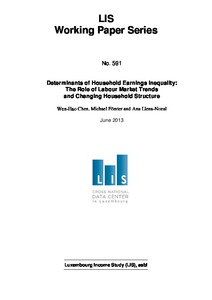Determinants of household earnings inequality: the role of labour market trends and changing household structure
"This article assesses various underlying driving factors for the evolution of household earnings inequality or 23 OECD countries from the mid-1980s to the mid-2000s. There are a number of factors at play. Some are related to labour market trends – increasing dispersion of individual wages and...
| Main Authors: | , , |
|---|---|
| Institution: | ETUI-European Trade Union Institute |
| Format: | TEXT |
| Language: | English |
| Published: |
Luxembourg
2013
LIS |
| Subjects: | |
| Online Access: | https://www.labourline.org/KENTIKA-19126963124919441459-Determinants-of-household-earn.htm |
| Summary: | "This article assesses various underlying driving factors for the evolution of household earnings inequality or 23 OECD countries from the mid-1980s to the mid-2000s. There are a number of factors at play. Some are related to labour market trends – increasing dispersion of individual wages and changes in men’s and women’s employment rates. Others relate to shifts in household structures and family formation – more single-headed households and increased earnings correlation among partners in couples. The contribution of each of these factors is estimated using a semi parametric decomposition technique. The results reveal that marital sorting and household structure changes contributed, albeit moderately, to increasing household earnings inequality, while rising women’s employment exerted a sizable equalising effect. However, changes in labour market factors, in particular increases in men’s earnings disparities, were identified as the main driver of household earnings inequality, contributing between one-third and one-half to the overall increase in most countries. Sensitivity analysis applying a reversed-order decomposition suggests that these results are robust." |
|---|---|
| Physical Description: | 39 p. Digital |

